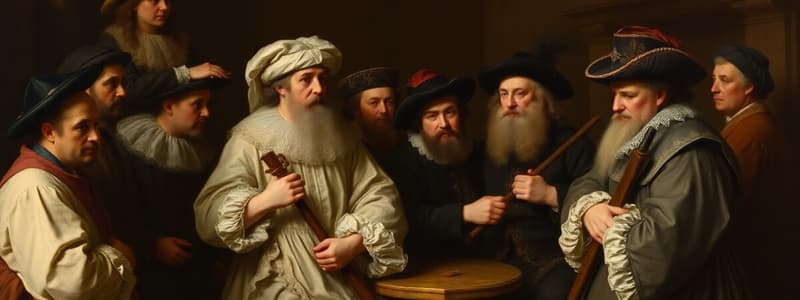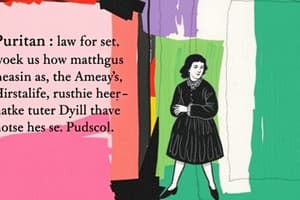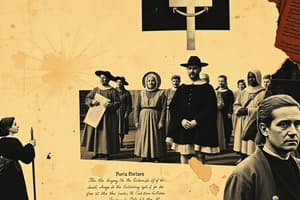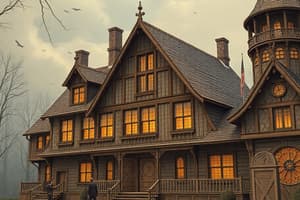Podcast
Questions and Answers
What significant event happened during Charles I's reign that marked a shift in the relationship between the monarchy and Parliament?
What significant event happened during Charles I's reign that marked a shift in the relationship between the monarchy and Parliament?
- The signing of the Magna Carta
- The demolition of Parliament for eleven years (correct)
- The execution of Charles I
- The establishment of the Church of England
Which group supported Charles I during the English Civil War?
Which group supported Charles I during the English Civil War?
- The Puritans
- The Royalists (correct)
- The Roundheads
- The Cavaliers (correct)
Who emerged as the leader of the Parliament's forces during the English Civil War?
Who emerged as the leader of the Parliament's forces during the English Civil War?
- Oliver Cromwell (correct)
- King Charles I
- James I
- Thomas More
What was one of the most shocking outcomes of the English Civil War?
What was one of the most shocking outcomes of the English Civil War?
What title did Oliver Cromwell hold after the execution of Charles I?
What title did Oliver Cromwell hold after the execution of Charles I?
What was a characteristic belief held by Charles I regarding his kingship?
What was a characteristic belief held by Charles I regarding his kingship?
Which of the following best describes the Puritans?
Which of the following best describes the Puritans?
During what period did the English Civil War take place?
During what period did the English Civil War take place?
How long did Charles I dismiss Parliament during his reign, contributing to rising tensions?
How long did Charles I dismiss Parliament during his reign, contributing to rising tensions?
What was one of the major actions taken by Oliver Cromwell's rule?
What was one of the major actions taken by Oliver Cromwell's rule?
What was John Milton's argument in his work 'Areopagitica'?
What was John Milton's argument in his work 'Areopagitica'?
What did Puritans believe about entertainment and celebrations?
What did Puritans believe about entertainment and celebrations?
Why did John Milton support the execution of King Charles I?
Why did John Milton support the execution of King Charles I?
What significant literary focus emerged during the Puritan period?
What significant literary focus emerged during the Puritan period?
What was the outcome of Oliver Cromwell's death regarding leadership?
What was the outcome of Oliver Cromwell's death regarding leadership?
What was the Restoration in English history?
What was the Restoration in English history?
Which of the following best describes the literary works of John Milton?
Which of the following best describes the literary works of John Milton?
What prompted debates about individual rights and freedoms during and after Cromwell's rule?
What prompted debates about individual rights and freedoms during and after Cromwell's rule?
Which of the following writers is associated with religious themes during the Puritan period?
Which of the following writers is associated with religious themes during the Puritan period?
What was a key factor that contributed to the tension between Charles I and Parliament?
What was a key factor that contributed to the tension between Charles I and Parliament?
Who were the supporters of the Parliament during the English Civil War?
Who were the supporters of the Parliament during the English Civil War?
What significant event occurred after the English Civil War in 1649?
What significant event occurred after the English Civil War in 1649?
What was Oliver Cromwell's position during his leadership after the execution of Charles I?
What was Oliver Cromwell's position during his leadership after the execution of Charles I?
What unique action did Parliament take against Charles I in 1649?
What unique action did Parliament take against Charles I in 1649?
Which of the following best describes the Puritans during the Puritan Age?
Which of the following best describes the Puritans during the Puritan Age?
What was one of the primary reasons Charles I's marriage to a Catholic princess caused concern?
What was one of the primary reasons Charles I's marriage to a Catholic princess caused concern?
How did the English Civil War affect the social landscape of England?
How did the English Civil War affect the social landscape of England?
What was the duration of Charles I's period of dismissing Parliament?
What was the duration of Charles I's period of dismissing Parliament?
What was Oliver Cromwell's significant military achievement during the English Civil War?
What was Oliver Cromwell's significant military achievement during the English Civil War?
What was one of the outcomes of Oliver Cromwell's leadership methods?
What was one of the outcomes of Oliver Cromwell's leadership methods?
Which genre of writing was particularly influential during the Puritan period?
Which genre of writing was particularly influential during the Puritan period?
What belief motivated the Puritans to close theaters in 1642?
What belief motivated the Puritans to close theaters in 1642?
What was a significant theme in John Milton's writings?
What was a significant theme in John Milton's writings?
What impact did Oliver Cromwell's death have on England's leadership?
What impact did Oliver Cromwell's death have on England's leadership?
What was the primary focus of writers during the Puritan period?
What was the primary focus of writers during the Puritan period?
What marked the event known as the Restoration in 1660?
What marked the event known as the Restoration in 1660?
What consequence did the strict Puritan rules have on society during Cromwell's rule?
What consequence did the strict Puritan rules have on society during Cromwell's rule?
Which of the following best represents John Milton's views on justice?
Which of the following best represents John Milton's views on justice?
How did the Puritan perspective influence the literary works of the period?
How did the Puritan perspective influence the literary works of the period?
Flashcards
The Puritan Age
The Puritan Age
The period in English history from 1625 to 1660, marked by political and social upheaval, religious tensions, and ultimately, the English Civil War.
King Charles I
King Charles I
The son of King James I, who became King of England in 1625. He was known for his stubbornness and belief in the divine right of kings.
Parliament
Parliament
The English Parliament during Charles I's reign, who opposed the king's policies and eventually challenged his authority.
Royalists or Cavaliers
Royalists or Cavaliers
Supporters of King Charles I during the English Civil War.
Signup and view all the flashcards
Parliamentarians or Roundheads
Parliamentarians or Roundheads
Those who supported Parliament during the English Civil War.
Signup and view all the flashcards
Oliver Cromwell
Oliver Cromwell
A military leader and a Puritan who led the Parliamentarian forces during the English Civil War.
Signup and view all the flashcards
English Civil War
English Civil War
A major conflict in England from 1642 to 1649, fought between the Royalists and the Parliamentarians.
Signup and view all the flashcards
Trial of King Charles I
Trial of King Charles I
A trial held by the Parliament in 1649, where King Charles I was found guilty of treason and executed.
Signup and view all the flashcards
Execution of King Charles I
Execution of King Charles I
The execution of King Charles I by beheading in 1649, a shocking event that marked the end of the monarchy.
Signup and view all the flashcards
Lord Protector
Lord Protector
The title given to Oliver Cromwell after the execution of King Charles I, when England was ruled as a republic.
Signup and view all the flashcards
Puritan Period
Puritan Period
The period in English history from 1642 to 1660, marked by the rule of Oliver Cromwell and the Puritans' influence on society and culture.
Signup and view all the flashcards
Puritans
Puritans
A group of English Protestants who sought to purify the Church of England from Catholic influence.
Signup and view all the flashcards
Interregnum
Interregnum
The time in England between the execution of Charles I and the restoration of the monarchy, 1649-1660.
Signup and view all the flashcards
Restoration
Restoration
The act of restoring the monarchy, in this case, Charles II, after the Interregnum.
Signup and view all the flashcards
John Milton
John Milton
A key figure of the Puritan period, known for his writings on religion and freedom of the press.
Signup and view all the flashcards
Areopagitica
Areopagitica
Milton's famous work that defends the freedom of the press, arguing against government censorship.
Signup and view all the flashcards
Equality before the law
Equality before the law
The belief that everyone should be treated equally under the law, regardless of their social status.
Signup and view all the flashcards
Democracy
Democracy
The political system where citizens have the right to choose their leaders through elections, and power is shared among different branches of government.
Signup and view all the flashcards
Individual rights
Individual rights
The rights and freedoms that individuals are entitled to, such as the right to free speech, religion, and assembly.
Signup and view all the flashcards
The English Civil War (1642-1649)
The English Civil War (1642-1649)
A period in English history when Parliament battled King Charles I for control of England.
Signup and view all the flashcards
Charles I
Charles I
The English monarch, son of James I who was very different, more stubborn, and less willing to compromise, which resulted in a conflict with Parliament.
Signup and view all the flashcards
Royalists (Cavaliers)
Royalists (Cavaliers)
A group who supported King Charles I during the English Civil War.
Signup and view all the flashcards
Parliamentarians (Roundheads)
Parliamentarians (Roundheads)
A group who opposed King Charles I and supported Parliament during the English Civil War.
Signup and view all the flashcards
The Puritan Period
The Puritan Period
A period in English history from 1642 to 1660 characterized by strict Puritan rule, social reforms, and the execution of King Charles I.
Signup and view all the flashcardsStudy Notes
The Puritan Age (1625-1660)
- Marked a turbulent period in English history following the death of James I and the accession of Charles I in 1625.
- Charles I, unlike his father, was stubborn and unwilling to compromise with Parliament, believing in the divine right of kings.
- His marriage to a French Catholic princess increased Protestant anxieties.
- The dissolution of Parliament from 1629 to 1640 further fueled public anger and resentment.
- Political divisions emerged, with Royalists (supporters of the king) and Roundheads (supporters of Parliament) engaging in conflict, often including family and friends on opposing sides.
- The English Civil War (1642-1649) resulted from these political tensions, causing significant societal upheaval.
- Oliver Cromwell, a skilled military leader, led the Parliamentarian forces to victory.
The English Civil War (1642-1649)
- The English Civil War (1642-1649) was a dramatic event in English history, the first time the English people were divided into two warring armies.
- Parliamentary forces, led by Oliver Cromwell, achieved victory in 1649.
- Charles I was put on trial and executed in 1649, a shocking event in European history and the first of its kind in England.
- Charles argued that only God could judge him, refusing to defend himself against Parliament.
- This trial and execution signified a major shift in the power dynamic between monarchy and parliament.
Oliver Cromwell's Leadership
- Cromwell became Lord Protector after the king's execution, establishing strict Puritan rules and utilizing the army to maintain order.
- Puritan beliefs dominated society, with theaters closed in 1642 due to religious objections and limitations on celebrations and entertainments.
- Cromwell's leadership, though strong militarily, lacked a peaceful approach to governing.
John Milton
- A significant writer of the period, focusing on religion and politics.
- Published "Areopagitica," a pivotal work advocating for freedom of the press, arguing for the free exchange of ideas.
- Supported the execution of King Charles I, believing in equality before the law for all, including the king.
- Wrote religious poetry like "Paradise Lost," exploring religious themes such as the story of Adam and Eve.
Death of Oliver Cromwell and the Restoration (1658-1660)
- Oliver Cromwell's death in 1658 resulted in instability, with his son Richard taking over as Lord Protector.
- Public dissatisfaction with strict Puritan rules and the desire for a more relaxed lifestyle grew.
- Parliament invited Charles II from France to become king in 1660, marking the Restoration of the monarchy.
- The Restoration signified a shift, limiting the king's power by making him subject to parliamentary limitations.
- The power dynamic now involved parliamentary oversight and debate regarding the monarchy's power.
Studying That Suits You
Use AI to generate personalized quizzes and flashcards to suit your learning preferences.




